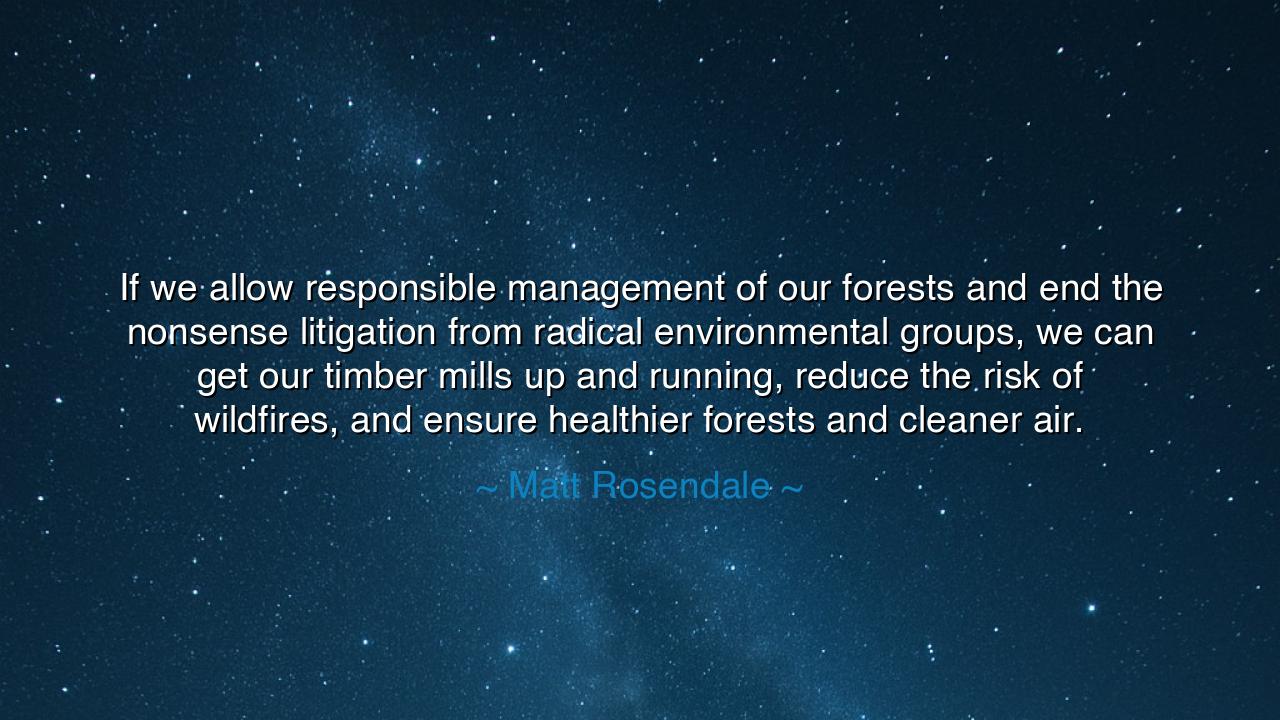
If we allow responsible management of our forests and end the
If we allow responsible management of our forests and end the nonsense litigation from radical environmental groups, we can get our timber mills up and running, reduce the risk of wildfires, and ensure healthier forests and cleaner air.






Hear the words of Matt Rosendale, uttered with the urgency of one who beholds both danger and opportunity: “If we allow responsible management of our forests and end the nonsense litigation from radical environmental groups, we can get our timber mills up and running, reduce the risk of wildfires, and ensure healthier forests and cleaner air.” These words are born of conflict—the clash between those who would cut and those who would preserve, between the guardians of industry and the guardians of wilderness. Yet within them lies a vision of balance, where stewardship and livelihood might walk hand in hand.
The meaning of this quote lies in the phrase responsible management. For the forest, if left wholly untouched, may grow wild with fuel until flame consumes it, and if exploited without restraint, may be stripped barren until life cannot return. To manage is not to dominate, but to guide—removing what chokes growth, harvesting in measure, and caring for the land as one cares for a garden. Rosendale’s cry is against what he sees as excessive litigation, where endless battles in courts prevent any action, leaving the forests vulnerable to fiery ruin while communities languish in economic despair.
The origin of these words lies in the struggles of the American West, where timber mills once roared with life, sustaining families and towns. Yet as the environmental movement grew, restrictions increased, lawsuits multiplied, and logging slowed. At the same time, wildfires grew fiercer, fed by decades of unmanaged growth and changing climates. Rosendale speaks from this crucible of tension, where workers seek to revive industry, while activists fear the ruin of nature. His quote is the voice of one side of this struggle, proclaiming that wise use of the forest can bring both prosperity and safety.
History gives us a mirror in the tale of ancient Rome, whose legions cut vast forests for fuel, ships, and cities. Where moderation was practiced, Rome thrived with wood for fire and shelter. But where greed ruled, lands were stripped bare, and deserts spread where forests once stood. The lesson of Rome is that responsible management is not mere rhetoric—it is the difference between flourishing and collapse. A forest tended with wisdom lives for centuries; a forest abandoned to fire or greed dies swiftly.
The lesson carved here is profound: stewardship demands both protection and use. To lock away the land entirely is to abandon its potential and sometimes invite disaster; to exploit it recklessly is to destroy its future. True balance lies in responsible management—harvesting with wisdom, replanting with care, and ensuring that every cut tree is replaced with growth, every act of industry matched with acts of renewal. This balance ensures not only jobs and prosperity, but also healthier forests and cleaner air for generations yet to come.
What then must we do? As citizens, we must rise above the noise of extremes. Support practices that combine economic vitality with ecological stewardship. Demand that timber industries adopt sustainable methods—selective logging, replanting, and respect for biodiversity. At the same time, call for environmental advocates to seek cooperation, not endless delay, remembering that unmanaged forests are not always safe forests. For the true enemy is not one another, but the flames of wildfires and the specter of environmental ruin.
And to the children of tomorrow, remember this wisdom: the forest is both treasure and teacher. It offers wood for shelter, air for breath, and beauty for the soul. But it also demands respect. Walk its paths not as conquerors, nor as distant admirers, but as caretakers. Harvest with gratitude, protect with vigilance, and know that the strength of a people is bound to the strength of their land.
Thus, let Rosendale’s words be taken not merely as political cry, but as a call to stewardship: “If we allow responsible management of our forests, we can reduce the risk of wildfires, ensure healthier forests, and cleaner air.” Let future generations learn that prosperity and preservation are not enemies but allies, if only we have the courage to embrace balance.






AAdministratorAdministrator
Welcome, honored guests. Please leave a comment, we will respond soon